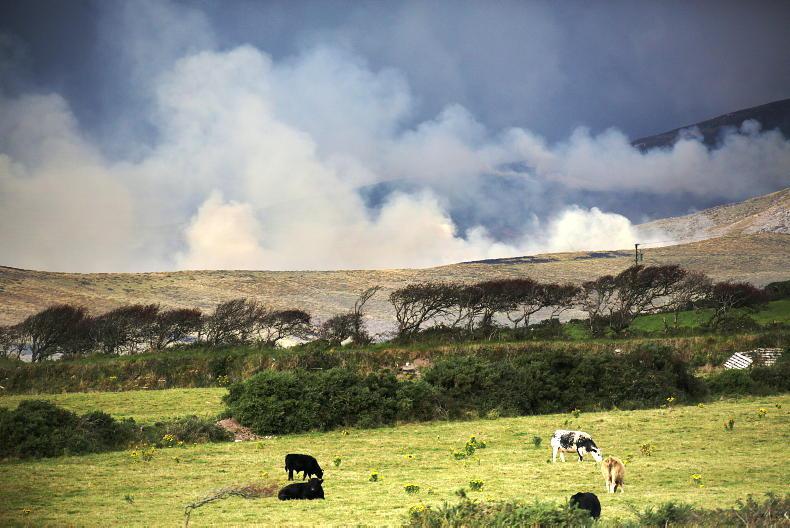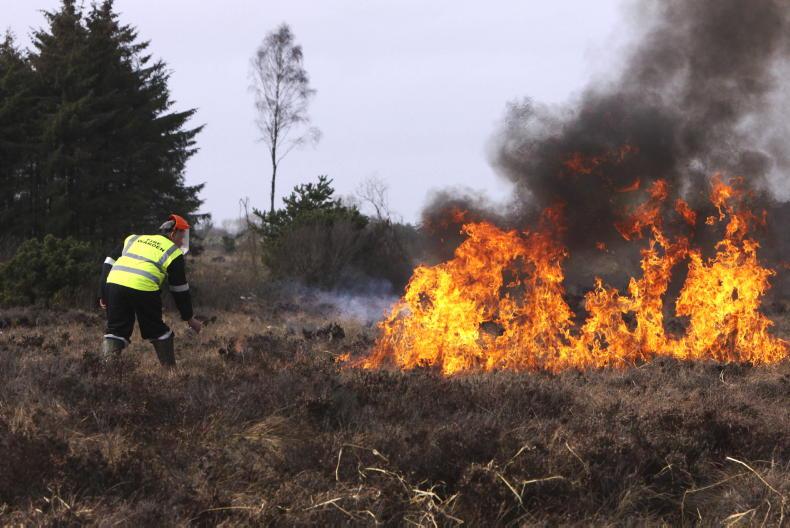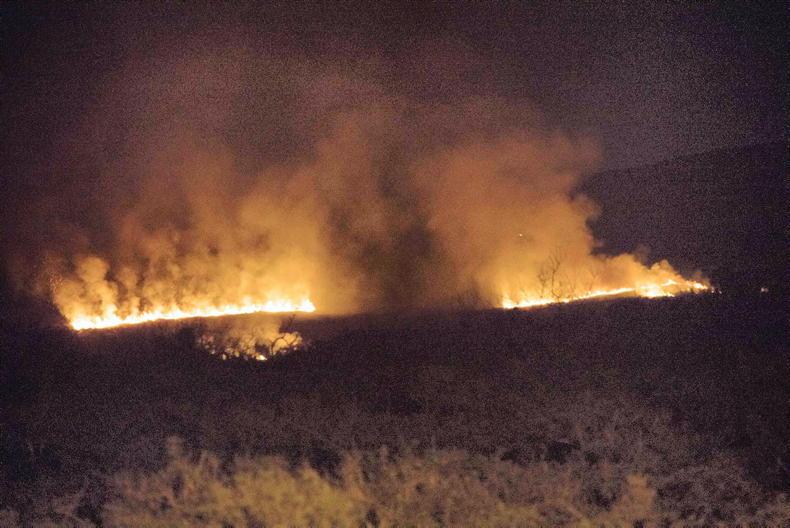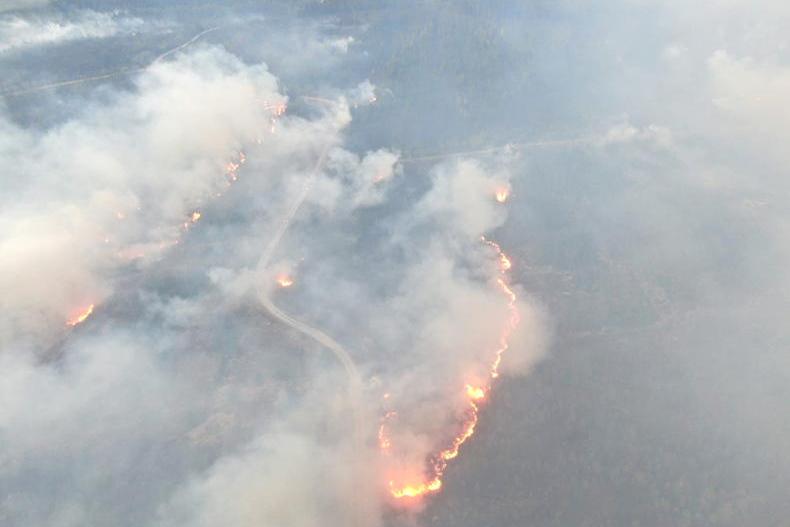This week marks the start of National Fire Safety Week for 2021, which will take place virtually and runs from 4-11 October this year.
This year’s campaign, jointly run with the Northern Ireland Fire and Rescue Service, is about enhancing fire safety.
Last year, 191 fires in agricultural buildings were attended by fire brigades across the country.
Some 2,817 fires were attended that were started on bogs, grass and in forests.
The counties with the most fires in farm buildings were Cork (23), Tipperary (21) and Galway (17).
Every year, the fire service attends fires on farms and the most common fires are started in hay barns.
Farms are particularly vulnerable to arson due to their isolated location, open boundaries, readily ignitable hay and straw, all of which make them an easy target.
While arson attacks on farms may be difficult to eliminate, there are a number of simple precautions farmers can take to reduce the risk of fires and attacks.
Precautions
Hay and straw should be removed from fields as soon as possible after harvesting. Lighted cigarette butts thrown into fields from passing vehicles can mean the loss of whole fields of crops.
Hay and straw should be stored separately from other buildings, particularly those housing fuels, agrochemicals and machinery.
Straw and hay should be stored in stacks of a reasonable size and should be separate from livestock housing where possible. Always have an evacuation plan for livestock.
Glass bottles should not be left lying around in grass or woodlands, as they can cause fires of huge proportions.

Hay and straw should be removed from fields after harvesting to prevent fires. \ Valerie O'Sullivan
Electrical wiring should be checked regularly by a competent person to avoid overheating or arcing of connections in hay barns.
Tips
Electric fences should not be located near the storage of hay/straw due to arcing that may occur when wires touch off objects.Petrol, diesel and other fuels should be stored in secure areas, and storage tank outlets should be padlocked.Fertilisers and pesticides should be kept under lock and key in a secure area.Farm refuse should be disposed of safely and on a regular basis.Farmers should avoid using machinery in or near hay barns because exhaust sparks may be released into the stored fodder.To allow access for the fire brigade, entrances and gates should be at least 3m wide.
All farms should have firefighting equipment, which should be properly maintained and checked to ensure that it is in good order.
Farmers should prepare a fire routine and action plan, to ensure all farm workers know what to do in the event of a fire.
Farm staff should have knowledge of the access points to nearby water supplies, which will help the fire brigade when trying to fight a fire.
In the event of a farm fire
Call 112 or 999 immediately. Speak calmly and clearly and only hang up when the operator tells you to.Only attempt to fight the fire if it is safe to do so.Send someone to the farm entrance to direct the fire brigade to the fire.Prepare to evacuate livestock in the event that the fire spreads.Prepare to use farm machinery to assist the fire brigade under their supervision.National Fire Safety Week marks the beginning of an intensive media advertising campaign to run until spring 2022.
However, it is imperative that the public awareness of the dangers of fire be maintained throughout the year.
This week marks the start of National Fire Safety Week for 2021, which will take place virtually and runs from 4-11 October this year.
This year’s campaign, jointly run with the Northern Ireland Fire and Rescue Service, is about enhancing fire safety.
Last year, 191 fires in agricultural buildings were attended by fire brigades across the country.
Some 2,817 fires were attended that were started on bogs, grass and in forests.
The counties with the most fires in farm buildings were Cork (23), Tipperary (21) and Galway (17).
Every year, the fire service attends fires on farms and the most common fires are started in hay barns.
Farms are particularly vulnerable to arson due to their isolated location, open boundaries, readily ignitable hay and straw, all of which make them an easy target.
While arson attacks on farms may be difficult to eliminate, there are a number of simple precautions farmers can take to reduce the risk of fires and attacks.
Precautions
Hay and straw should be removed from fields as soon as possible after harvesting. Lighted cigarette butts thrown into fields from passing vehicles can mean the loss of whole fields of crops.
Hay and straw should be stored separately from other buildings, particularly those housing fuels, agrochemicals and machinery.
Straw and hay should be stored in stacks of a reasonable size and should be separate from livestock housing where possible. Always have an evacuation plan for livestock.
Glass bottles should not be left lying around in grass or woodlands, as they can cause fires of huge proportions.

Hay and straw should be removed from fields after harvesting to prevent fires. \ Valerie O'Sullivan
Electrical wiring should be checked regularly by a competent person to avoid overheating or arcing of connections in hay barns.
Tips
Electric fences should not be located near the storage of hay/straw due to arcing that may occur when wires touch off objects.Petrol, diesel and other fuels should be stored in secure areas, and storage tank outlets should be padlocked.Fertilisers and pesticides should be kept under lock and key in a secure area.Farm refuse should be disposed of safely and on a regular basis.Farmers should avoid using machinery in or near hay barns because exhaust sparks may be released into the stored fodder.To allow access for the fire brigade, entrances and gates should be at least 3m wide.
All farms should have firefighting equipment, which should be properly maintained and checked to ensure that it is in good order.
Farmers should prepare a fire routine and action plan, to ensure all farm workers know what to do in the event of a fire.
Farm staff should have knowledge of the access points to nearby water supplies, which will help the fire brigade when trying to fight a fire.
In the event of a farm fire
Call 112 or 999 immediately. Speak calmly and clearly and only hang up when the operator tells you to.Only attempt to fight the fire if it is safe to do so.Send someone to the farm entrance to direct the fire brigade to the fire.Prepare to evacuate livestock in the event that the fire spreads.Prepare to use farm machinery to assist the fire brigade under their supervision.National Fire Safety Week marks the beginning of an intensive media advertising campaign to run until spring 2022.
However, it is imperative that the public awareness of the dangers of fire be maintained throughout the year.











SHARING OPTIONS